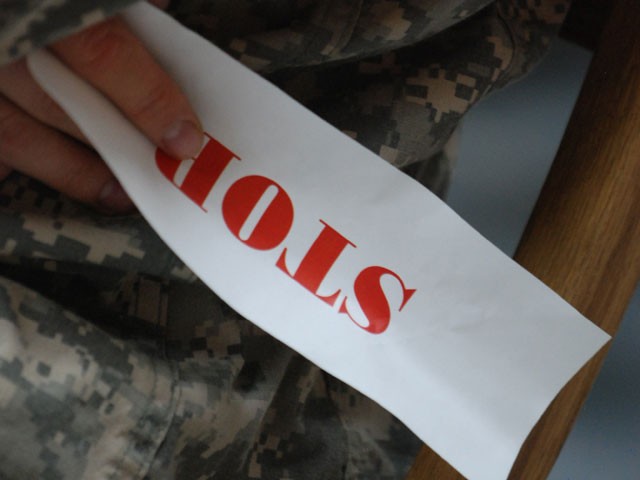CAMP VICTORY, BAGHDAD -- As the scene unfolded, an audience of about 400 United States Forces-Iraq servicemembers went silent.
"I didn't rape that girl," he said.
"She did whisper 'no,' but she didn't do anything to reinforce it; I thought she didn't mean it."
"So you didn't listen to or respect her enough to stop and at least ask," the woman questioned.
Two actors, Kyle Terry and Sharyon Culberson, using only two chairs as props, presented "Sex Signals," an improvised skit created by Catharsis Productions to discuss sexual assault with servicemembers, April 19.
Terry and Culberson used a mix of humor and drama to discuss the miscommunications between men and women. They presented situations that are common to everyday life and illustrated how choices made by both parties and those around them can lead to sexual assault.
The program was a different approach to talking about sexual assault.
"It's something every servicemember should see when they first deploy, so they know how to avoid situations that could result in sexual assault," said Sgt. Sean Forsythe, an intelligence analyst with the 35th Theater Tactical Signal Brigade.
The message reinforced the theme for April, which is designated as Sexual Assault Awareness Month: 'What hurts one, affects all. Preventing sexual assault is everyone's duty.'
"Servicemembers are here for an entire year," said Sgt. 1st Class Peter Farmer, the United States Forces-Iraq deployed sexual assault response coordinator. "If Soldiers don't watch out for one another they risk losing their battle buddies."
The best way to stop sexual assault, he said, is to prevent it.
"We want to be proactive ... we want to try and eliminate some of these things before they start," Farmer said.
"Sexual assault in the military, particularly inside your unit and your team, is as devastating in its own way as incest," said a USF-I Soldier who was a victim of sexual assault. "Someone you have been taught to trust, someone who worked beside you, laughed and joked with you, someone you even liked - violated every value the military has impressed on you. He betrayed your trust and your confidence in the team."
Sexual assault also affects more than the offender and the victim, Farmer said. It's a common misconception that sexual assault only affects the two parties involved. In reality, it affects units, friends, family, and the integrity of the military.
"When sexual assault happens in a unit, there are many people who are taken out of the fight," he said.
Farmer said that if an unrestricted report is filed, it requires the involvement of the first sergeant and commander. Individuals will go through a process involving the criminal investigative division to interview, the staff judge advocate, and possibly through court-martial proceedings.
In addition, it can affect the readiness of a unit by creating animosity, he said. People start choosing sides and then the unit becomes polarized. Servicemembers are either on the side of the victim or believe the alleged offender is innocent.
"Unit readiness in large part depends on cohesion, which is based largely on mutual trust and loyalty," said Capt. Peter Higbie, commander of Company A, TF Phantom.
"If the perpetrator is from the same unit as the victim, the negative effect on unit cohesion is obvious. But even if the perpetrator is not from the unit, unit cohesion may still suffer if Soldiers perceive that the chain of command cannot protect its Soldiers."
Farmer says the goal of Sexual Assault Awareness Month is to educate every servicemember and civilian about sexual assault.
While education is important, the main goal for USF-I leadership is not to just reduce sexual assault, it's to eliminate it, said Command Sgt. Maj. Kevin Stuart, command sergeant major of TF 1st Medical Brigade.
"Soldiers have a duty to other soldiers to report these crimes so that the chain of command can take appropriate action to ensure the health and welfare of those involved in the incident," Higbie said. "From a command perspective, punishing offenders to the fullest extent of the UCMJ is an important way to show soldiers that sexual assault is behavior that will not be tolerated."
"The chain of command cannot do that if no report exists," he continued. "I understand, though, why some victims want to file restricted reports. Restricted reporting is important to ensure those victims who don't want to go public still have access to medical treatment and other resources to help them cope."
It's good to bring awareness about this to service members, said Forsythe. With programs like Sex Signals it makes people think about how to prevent sexual assault.
"American Soldiers are members of a band of brothers and sisters, bonded by Army values, duty to country and loyalty to each other," said Master Sgt. Rita Cossio, a USF-I DSARC. "As Soldiers and leaders, it is our responsibility to set the climate and conditions where safety is promoted and where a fellow Soldier is not hampered by fear of sexual assault or reprisal against reporting a sexual assault."


Social Sharing